Google wins antitrust war but loses exclusive search deals

Google just won the antitrust war. The tech giant will not be forced to break up its search business, but a federal judge instead ordered targeted changes to curb anticompetitive practices. After years of legal battles in Washington, Google emerges battered but intact: no breakup of its search empire, but new restrictions on the exclusive deals that helped cement its dominance.
Judge’s Ruling: Remedies Without a Breakup
In a 226-page decision, U.S. District Court Judge Amit Mehta rejected the Justice Department’s most aggressive proposals, including forcing Google to spin off Chrome or Android, or banning it from paying for default search placement altogether. Those moves, he said, risked collateral damage to partners like Mozilla and consumers who benefit from revenue-sharing deals.
“Unlike the typical case where the court’s job is to resolve a dispute based on historic facts, here the court is asked to gaze into a crystal ball and look to the future. Not exactly a judge’s forte,” Mehta wrote.
Instead, Mehta accepted “in full” most of Google’s proposed remedies, with modifications, and only a handful of the government’s asks. The order prohibits Google from striking or maintaining exclusive arrangements that tie the distribution of Search, Chrome, Google Assistant, or Gemini to other apps or revenue deals.
The ruling also requires Google to:
-
Share portions of its search index and user-interaction data with “qualified competitors.”
-
Offer search and ad syndication services at standard rates.
-
Avoid conditioning Play Store licensing on the distribution of certain apps.
The remedies will run for six years, with oversight from a technical committee. A revised final judgment is due by September 10, with enforcement beginning 60 days after entry.
Judge Lets Google Keep Search Empire, Strikes Down Exclusive Deals
At the center of the case were Google’s massive default-placement agreements, which Mehta called “extremely valuable real estate” that locked rivals out. Google spent over $26 billion in 2021 alone to secure those positions, funneling roughly $18–20 billion annually to Apple. Those payouts — which make Google the default search on Safari — will continue, but under tighter constraints.
Apple’s stock jumped after hours on news that its lucrative partnership would largely remain intact, despite government calls to end it.
AI Changed the Game
Mehta acknowledged that generative AI shifted the context of the case. Filed in 2020 and tried in 2023, the lawsuit played out against the rise of ChatGPT and the rapid evolution of Google’s own AI-driven search. That backdrop softened the urgency of more drastic remedies, echoing concerns that antitrust enforcement often lags technological change.
Ripple Effects Across Tech
For Google, the decision wipes away the “antitrust bear case” that had clouded its stock since last year’s monopoly ruling. For Silicon Valley, it’s another marker of a pro-business regulatory era under the Trump administration, even as tariffs and immigration remain flashpoints.
But the outcome also raises bigger questions: how far should regulators go in reshaping Big Tech’s business models? Europe’s Digital Markets Act mandates broad data-sharing; Mehta opted for narrower, temporary obligations. That contrast could shape U.S. enforcement strategy in pending cases against Apple, Meta, and Amazon.
What’s Next
Google still faces a parallel trial over its ad-tech business, where Judge Leonie Brinkema has already ruled the company acted illegally. Remedies hearings kick off later this month, with potential divestitures on the table.
Even here, the story isn’t finished. Google could appeal Mehta’s decision, setting up a Supreme Court battle that might stretch into 2028. As one former FTC commissioner put it: “There are many acts to this play to go.”




